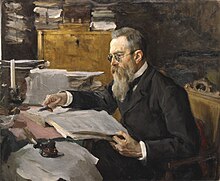Russian classical music
| Music of Russia | ||||||||
| Genres | ||||||||
|---|---|---|---|---|---|---|---|---|
| Specific forms | ||||||||
|
||||||||
| Media and performance | ||||||||
|
||||||||
| Nationalistic and patriotic songs | ||||||||
|
||||||||
| Regional music | ||||||||
|
||||||||
You can help expand this article with text translated from the corresponding article in Japanese. (May 2011) Click [show] for important translation instructions.
|
Russian classical music is a
Early history
In the period of
One of Russia's earliest music theorists was the Ukrainian
18th and 19th century

In the 18th century,
The first great Russian composer to exploit native Russian music traditions into the realm of Secular music was
This period also saw the foundation of the
The late 19th and early 20th century saw the third wave of Russian classics:
20th century: Soviet music
After the
In the 1930s, under the regime of
" and soon removed from theatres for years).The music patriarchs of the era were
21st century: Modern Russian music
The profile of "Classical" or concert hall music has to a considerable degree been eclipsed by on one hand the rise of commercial popular music in Russia, and on the other its own lack of promotion since the collapse of the USSR.[6] Yet a number of composers born in the 1950s and later have made some impact, notably Leonid Desyatnikov who became the first composer in decades to have a new opera commissioned by the Bolshoi Theatre (The Children of Rosenthal, 2005), and whose music has been championed by Gidon Kremer and Roman Mints. Meanwhile, Sofia Gubaidulina, amongst several former-Soviet composers of her generation, continues to maintain a high profile outside Russia composing several prestigious and well-received works including "In tempus praesens" (2007) for the violinist Anne-Sophie Mutter.
References
- ISBN 978-0-7546-3466-9
- ^ Dolskaya-Ackerly: p. 220.
- ^ "Russian Music before Glinka: A Look from the Beginning of the Third Millennium." Marina Ritzarev (Rytsareva), Bar-Ilan University
- ^ ISBN 978-0-271-02369-4
- ISBN 978-0-415-54620-1
- ^ See Richard Taruskin "Where is Russia's New Music?", reprinted in On Russian Music. Berkeley: University of California Press, 2009: p. 381
- Dolskaya-Ackerly, Olga. Vasilii Titov and the "Moscow" Baroque, JRMA, cxviii (1993), pp. 203–22.
- Jensen, Claudia R. A Theoretical Work of Late Seventeenth-Century Muscovy: Nikolai Diletskii's "Grammatika" and the Earliest Circle of Fifths, JAMS, xviii (1992), 305–31. (subscription required)
- Ritzarev, Marina. Eighteenth-century Russian music. Ashgate Publishing, Ltd., 2006. ISBN 978-0-7546-3466-9
